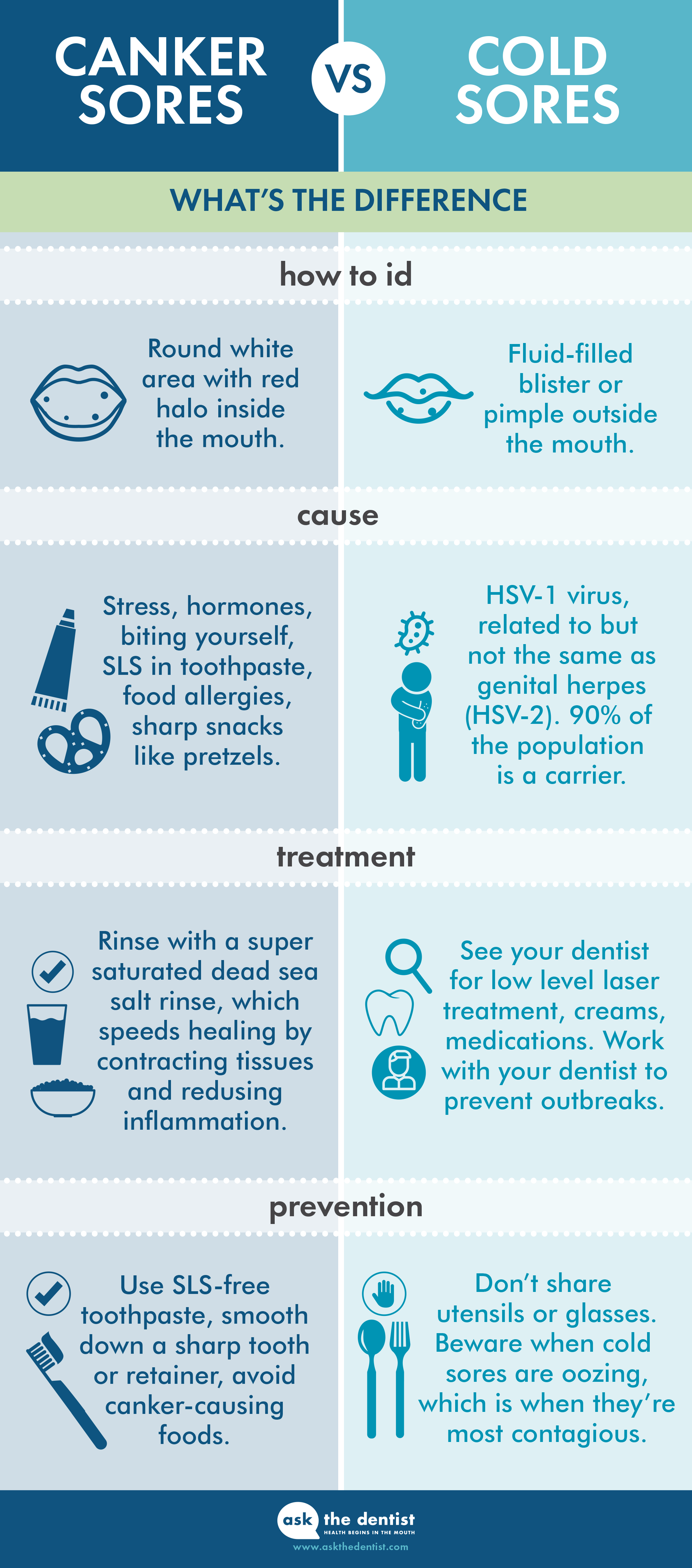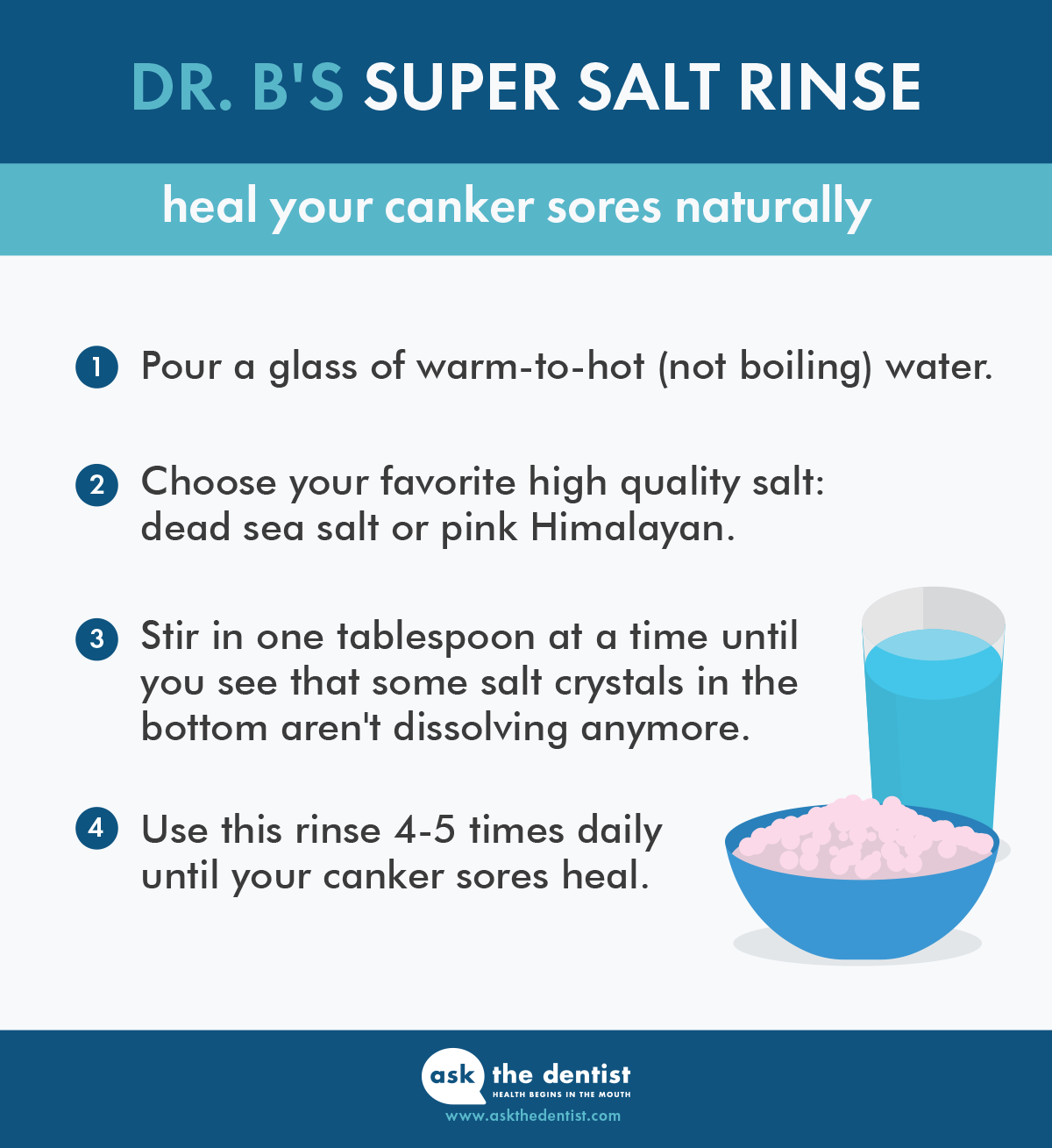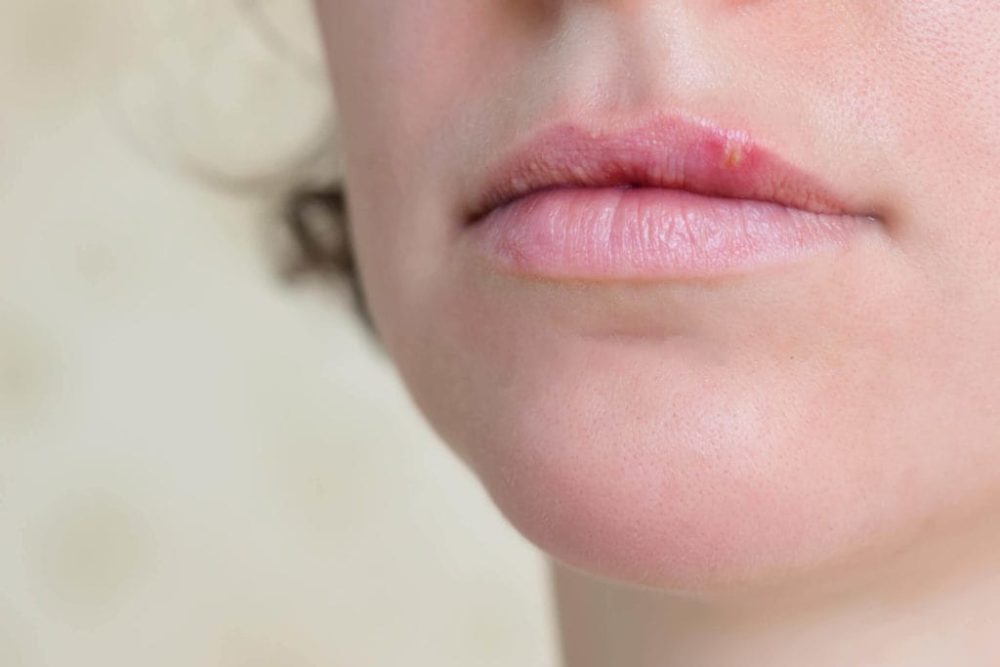Table of Contents[Hide][Show]
Canker sores and cold sores are often confused with each other, but they’re not the same. One is highly contagious and requires complex treatment. The other is annoying but is nothing to worry about.
So, how do you know if you have a canker sore or a cold sore? Should you worry? How do you treat a canker sore versus a cold sore? That’s what we’ll cover in this post.
In this article, you’ll learn:
- the difference between a canker and a cold sore
- how to know if you’re contagious
- how to prevent them
- how to treat them

How to Tell the Difference Between a Canker and a Cold Sore
Canker sores and cold sores are not the same thing. It’s essential to know the difference so you can treat them properly.
Canker sores are white ovals inside the mouth. Their medical term is an aphthous ulcer or an ulcerated canker. Canker sores are the less serious of the two and, while they can be very painful, are usually nothing to worry about.
Cold sores are like pimples outside the mouth. Their medical term is herpes labialis or oral herpes. Cold sores are more serious and require complex treatment. They are highly contagious. They are generally not serious but can be life-threatening for anyone with a decreased immune system thanks to medications or other disorders, such as AIDS.
First, let’s tackle canker sores.
Get Dr. B’s Dental Health Tips
Free weekly dental health advice in your inbox, plus 10 Insider Secrets to Dental Care as a free download when you sign up

What do canker sores look like?
Canker sores look like small, oval-shaped white or gray area surrounded by a red halo. They’re about 2-4mm in size.
You get canker sores inside the mouth. The common areas are the cheeks, tongue, and inner lips. They are not contagious.
What causes canker sores?
Think of cankers as autoimmune—they’re usually something you get when you’re run down. Cankers are much less likely to crop up when we’re getting enough rest and taking care of ourselves.
There’s no single cause of canker sores, and no one knows why some people get them more often than others, but they can usually be traced back to one or several of these things:
- Food allergies. Especially gluten sensitivity and wheat allergies.
- Nutrition Deficiency. Vitamin B12, Zinc, iron, or folic acid deficiencies may contribute to cankers (according to some studies in the literature available) although there isn’t enough research to back this up yet.
- Stress. Canker sores will come around during exams or other stressful times in your life. Conversely, managing stress can prevent canker sores.
- Hormonal changes. Medications, menstrual periods, or menopause can make you more likely to get a canker.
- Something sharp. We call this “mechanical trauma” in dentistry. Something sharp inside the mouth can cause a canker. This includes biting yourself, braces, a retainer that has a sharp edge, a sharp tooth, dental work, and even brushing too hard. Pretzels and chips are a common cause of canker sores since they’re sharp enough to irritate and cause a canker.
- Sodium lauryl sulfate (SLS). Most toothpastes contain SLS, the ingredient that gives toothpaste that foamy, tingly feeling, but SLS is strongly linked with canker sores as it is a surfactant that strips the delicate oral mucosa layer o the inside of the mouth.
- Acidic foods. Tomato sauce is a common culprit. A diet with too much processed foods, citrus, chocolate, wheat, and pasta can make you prone to canker sores.
How to treat a canker sore
The most important thing you can do for a canker sore is to find out what the root cause is.
Most of the time, I recommend you just wait it out (canker sores take about two weeks to go away on their own).
To speed up the healing process, I recommend rinsing with a super saturated salt rinse with either himalayan or dead sea salt. This may burn a little bit at first, but it speeds up healing because salt stimulates the closing of the aphthous ulcer. Saltwater is good for mouth injuries and sores because it increases blood flow to the affected area. This speeds up healing and reduces the amount of inflammation of the area. Saltwater is also an astringent that contracts the tissues and speeds up wound healing by reducing inflammation and contracting the tissues (British Dental Journal).

These methods won’t heal your canker sores—they can just help with the irritation and pain. To prevent irritating the canker sore while you wait for them to heal, try:
- A chamomile tea bag. Compounds in chamomile can reduce inflammation and soothe the pain in the area. Soak a tea bag of chamomile in filtered water and place against the canker sore for several minutes as many times a day as you like.
- Oil pulling. Oil pulling with a high-quality coconut oil can also help soothe the area of the sore.
- A sensitive toothbrush. If you’re prone to canker sores, buy a toothbrush for sensitive gums and replace it every month to make sure it’s not abrasive.
- Avoiding certain foods. Abstain from anything sharp, spicy, acidic, or very hot up until a few days after the last symptoms of the canker sore are gone. It’s also recommended to stay away from alcohol, tomato sauce, grapefruit, pretzels, chips, carbonated drinks, nuts, chocolate, coffee, and tea, which can all irritate cankers.
- Avoiding essential oils. These can cause the canker to burn and become irritated.
When you’re in a lot of pain, you can consider some of the following treatments. Keep in mind that none of these help the healing process or make cankers go away faster. These aren’t good long-term solutions and the pain relief is short-lived—often lasting only 15 minutes.
- Take ibuprofen. This could slow the healing process since it reduces blood flow to the wound site, so only consider this in extreme pain. Personally, I won’t use ibuprofen for this reason.
- Topical anesthetics. Benzocaine and other over-the-counter creams can relieve some of the pain while you wait for a canker to heal. Gives you a little pain relief, but could slow down healing.
- Topical steroids. These can also relieve canker pain.
- Medications and lasers. Your dentist can apply these.
- Anbesol. Anbesol is a numbing cream, but I’m not a big fan because it’s a strong chemical in your mouth and it’s only short-term relief that doesn’t treat the root cause.
What to stay away from
- Hydrogen peroxide. I’ve seen some websites that recommend hydrogen peroxide for canker sores, but there is no bacteria to kill and it will just irritate the ulcer further, causing more pain.
- Canker sore covers. These just don’t work and every time I’ve seen them used or used them myself, they make canker sores more painful and prolong the healing process.
- Listerine. It will burn and it’s not healing. Mouthwash is designed to kill bacteria and a canker sore is not a bacterial infection.
How to prevent canker sores
- Switch to an SLS-free toothpaste. SLS is a foaming agent added to most toothpastes. It strips the delicate oral mucosa layer in the mouth, irritating it and making it prone to canker sores. Consider making a homemade toothpaste.
- Check your nutrition. It’s worth checking into your diet to make sure that you aren’t deficient in something. A poorly nourished body can easily become run-down and canker sores could be a result of this. This isn’t proven in the literature, but then again, there are not a lot of scientific studies on canker sores to begin with.
- Take an oral probiotic. Probiotics restore the “good” balance of bacteria in the mouth that keeps the mouth healthy and resilient. This is the oral probiotic that I use.
- Download my canker sore diary. People with chronic canker sore outbreaks should record what foods they ate—keep a diary and determine if there’s a pattern.
What do cold sores look like?

Cold sores start out as tiny, fluid-filled blisters which eventually break open and then crust over. Before the blisters appear, they may start out as an itching, burning, or tingling sensation around the lips.
Cold sores are mainly found on our outside of lips and outside of mouth and they tend to recur at the same spot every time.
What causes cold sores?
Cold sores are caused by a virus. The virus spreads when people share utensils and cups, kiss, and even shake hands with someone who has touched their own oozing blister.
The first time people are exposed to the virus is usually around age five. Ninety percent of people will get a cold sore at least once during their lifetime—so most of us are carriers of the HSV type 1 virus.
Once you have the virus, it never goes away. It may lie dormant, but it can still be spread, even if you don’t have any cold sores or haven’t had any for years.
That virus is called HSV type 1 (HSV-1), which is closely related but not the same as genital herpes, which is caused by HSV type 2 (HSV-2).
A cold sore outbreak is typically triggered by:
- Sunlight
- Wind
- Hormonal changes
- Stress and fatigue
- Suppressed immune system
- Viral infections
How to treat a cold sore
Cold sores will heal by themselves in about 2-3 weeks. These are my tips for what to do during the healing process and how to get out of pain.
- Denavir. This is my favorite prescription cream. It’s a cream that you apply every 2 waking hours for four days. It’s active ingredient is an anti-viral and what I’ve seen in the last 10 years are very good results, so it’s my go-to. It’s prescription-only so you have to see your dentist for it.
- Low-level laser treatment. It’s expensive and available through your dentist and supposedly it has lasting effects, but that hasn’t been proven in the scientific literature.
- Medication. The creams attack the cold sore and its site, but you can attack the viral infection systemically by taking a pill. There are side effects, so try the cream first. Zovirax is the most popular.
- Avoid makeup. Covering up cold sores with makeup can slow down the healing process. If you have to cover up a cold sore for work, remove the makeup as soon as you get home, ideally with warm water and gauze instead of makeup remover, which contains usually alcohol and other solvents and will irritate the cold sore.
- Work with a shame-free dentist. I’ve seen some rare cases where dentists have judged patients with cold sore outbreaks. This is just plain wrong. Having cold sores is not a shameful thing. Ninety percent of people have the virus. Cold sores are very prevalent, with or without sexual activity. If you can’t discuss how to manage your cold sores openly with your dentist, move on and find a new one.
- Ice. Apply a cold pack directly to cold sores for temporary relief. It may not reduce the duration of the breakout, but it can ease discomfort and inflammation of the sores.
Avoid:
- Abreva, which empirically has no evidence that the active ingredient, Docosanol, actually works.
- Lemon balm, which is acidic and burns and has no healing benefits.
- Anything that covers the cold sore. The cold sore needs to be exposed to air in order to heal. If you cover it, you’re preventing the body from healing itself.
- Moisturizing creams or aloe vera. Don’t moisturize the area. The body tends to heal by drying out the area. Moisturizing the area can interfere with the body’s natural healing process.
How to prevent cold sores
- Apply sunblock or chapstick every day. Sunlight can trigger cold sores, so protecting your lips from the sun may protect against outbreaks.
Try an L-Lysine supplement. It hasn’t been proven, but a lot of people swear by an L-Lysine supplement to prevent cold sores. - Prevent lesions from spreading. Children sucking on their fingers or touching other parts of the body without washing their hands can cause cold sores to spread. In rare cases, the cold sore virus can spread to the eyes and cause scarring and impaired vision. All you need to worry about is washing your hands frequently and not touching the blister, especially when it’s oozing. Don’t let the fluid in that blister come into contact with anything else!
- Beware of others having an outbreak. If you come into contact with someone having an outbreak, keep in mind that they are highly contagious. Wash your hands frequently and do not touch your lips to prevent contracting the virus.
- Stress reduction. This one is key. Exercise, meditation, and learning how to keep your stress levels in check will go a long way to minimize outbreaks.
- Prevent spreading the virus to loved ones. Don’t kiss children on the lips, don’t share toothbrushes, cups or utensils, and wash your hands often. Avoid contact during outbreaks, especially when blisters are oozing, which is when they are most contagious. Don’t shake hands—you can tell people you’re recovering from a virus.
Mark Burhenne DDS
Got more questions about canker or cold sores? Ask me a question!
How Can I Cure My Frequent Canker Sores?
